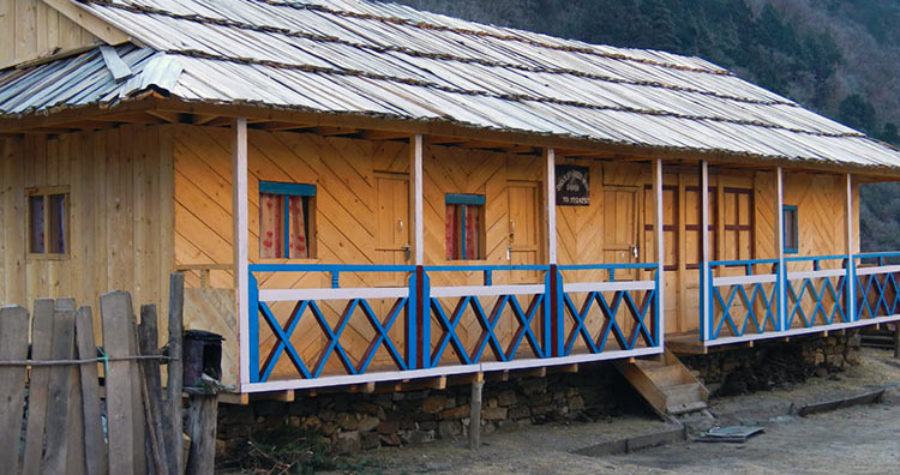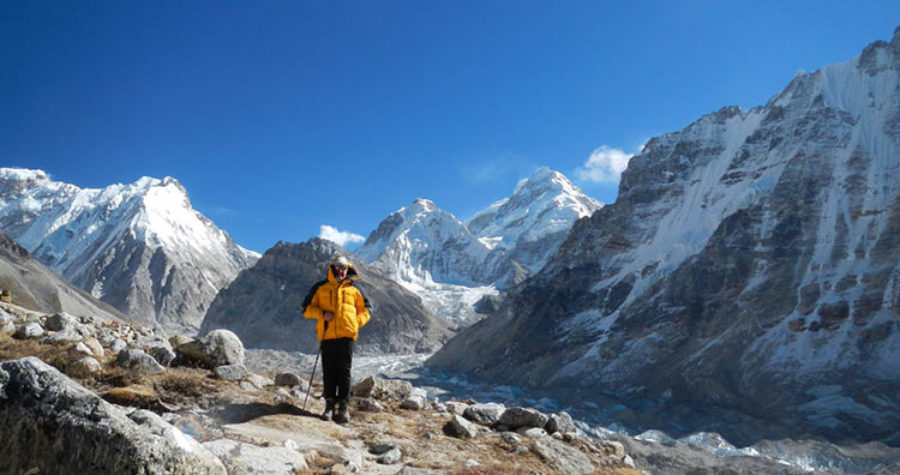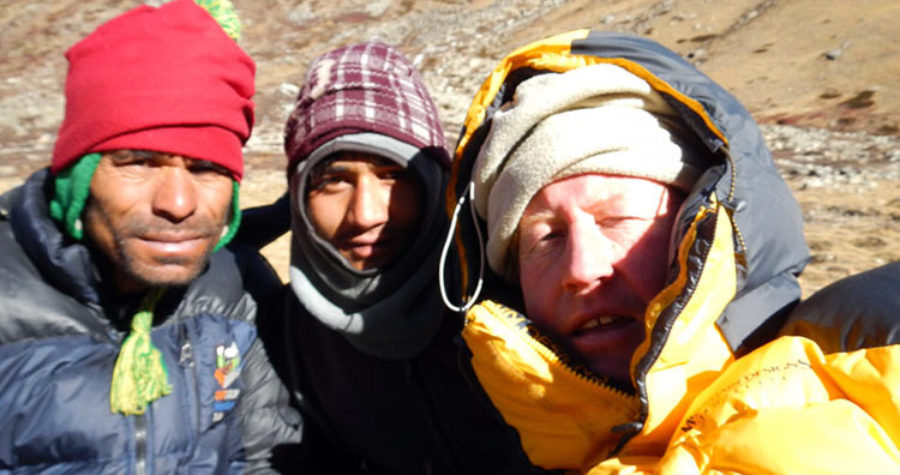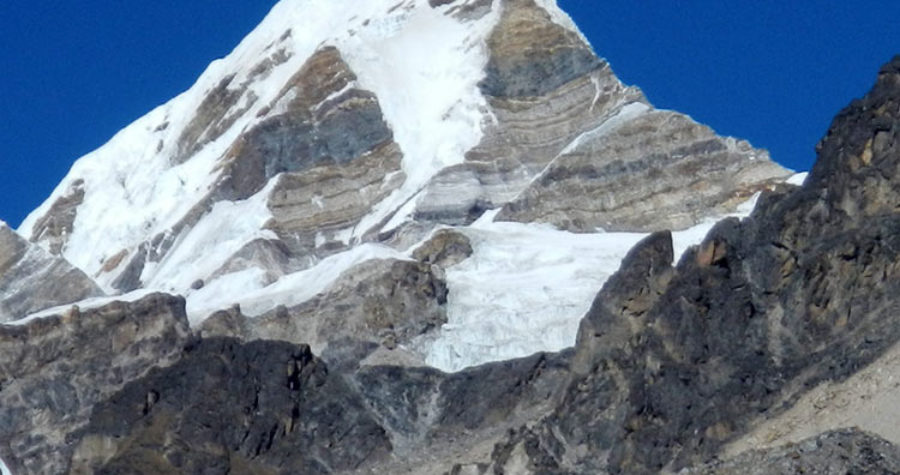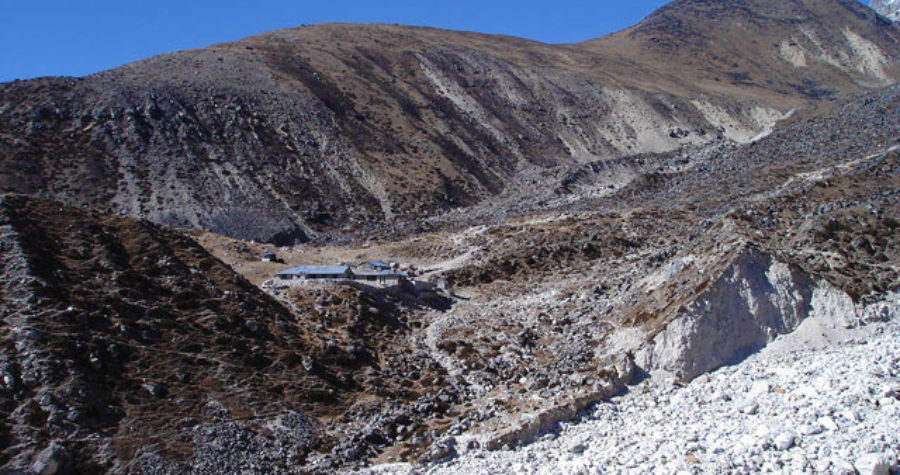Trip Highlights
- Less-traveled off-beat trek
- Highest Point-Pang Pema (5,100 m)
- Pass through lush alpine forests of rhododendron, pine, birch, and pristine alpine meadows.
- Remarkable Kanchanjunga Base Camp
- Untouched nature and varying cultures and ethnicities
- Immerse yourself in the Himalayan lifestyle and culture of locals
- Magnificent views of snow-capped peaks (Jannu, Chang, Kanchenjunga)
trip Overview
Kanchanjunga/Kanchenjunga Base Camp Trek is a full-fledged adventure trek taking place in the far-eastern corner of Nepal. It adjoins Sikkim province of India and is the least trekked section of the Himalayas. The region still awaits enthusiastic adventure seekers to unlock its fabulous sceneries and mysterious enclaves of rural life and cultures. Pass through lush alpine forests of rhododendron, pine, birch, and pristine alpine meadows. The remote Sherpa settlements make it not just a good trekking venture but an adventure quest in the Himalayas.
Several trekkers and climbers set out to visit Everest and Annapurna regions every year for adventure trekking and climbing. But, the Kanchanjunga Base Camp trek sees very few of them. However, the mountain was first conquered by two British mountaineers — Joe Brown and George Band — in 1955 A.D. In 1979 again, 3 other Britishers Doug Scott, Pete Boardman, and Joe Tasker successfully ascended the north ridge of the mountain. It is an astounding feat in the history of mountaineering.
Our itinerary takes you to the north base camp of Kanchanjunga, taking in fabulous scenes of Jannu, Chang Himal, and Kanchanjunga itself. Waiting along the trail are some formidable sections as well. It requires the visitors to walk through slippery sections on the riverbanks and landslides leaving no recognizable trail for trekkers. Yet when you negotiate all the difficulties and complete your journey, a sense of triumph and a rewarding experience of intimate touch with pristine nature and unspoiled culture give you deep satisfaction.
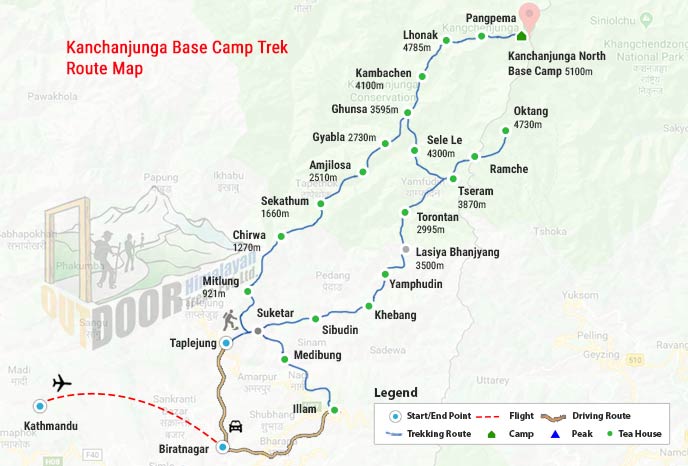
Itinerary
30 min Hotel
On your arrival at the Tribhuvan International Airport in Kathmandu, a representative from Outdoor Himalayan Treks will meet and greet you. Then s/he will transfer you to your hotel. After getting refreshed, you will meet the trekking guide in our office. He will brief you about the tour.
1 hr Hotel
If we complete all the preparations for the trekking on the day of your arrival, we fly to Biratnagar today. Otherwise, we will spend one more day in Kathmandu. In this case, you will be briefed about the tour by the guide at your convenient time. While we make all necessary arrangements for the tour, including the documentation and other formalities, you will have an entire day at your disposal. Make it worthwhile with a full day sightseeing. There are a number of incredibly rich heritage sites in Kathmandu, listed in the UNESCO World Heritage Site. You will be completely mesmerized by them. In that case we will fly to Biratnagar on the third day.
5-7 hrs Lodge/Teahouse
When the airport at Suketar in Taplejung is not functional; we have to drive to Taplejung. It is a long drive through many bends on the hilly road. But when the airport is functioning, we fly to Taplejung from Biratnagar and start our trek from there.
4 hrs Lodge/Teahouse
Today’s trek is very short, lasting for less than 4 hours. It consists of a descent from Taplejung to Mitlung. Mitlung is a small settlement on the banks of the Tamor River. We reach there by crossing Hungdewa Khola, a small stream.
5-7 hrs Lodge/Teahouse
Walking through beautiful villages and farmlands, we reach Chirwa. After starting from Mitlung, we reach the village Sinwa with bananas and grapevines. Enjoying idyllic rural views, we arrive at Chirwa, another beautiful village. Huge boulders are scattered around the village.
5-6 hrs Lodge/Teahouse
We enter into the Kanchanjunga Conservation Area. We walk across the fertile and ecologically diverse Tamor River Valley. Enjoying broad view of the valley and meeting a lot of birds and butterflies on the way, we reach the destination of the day in Sekathum. Before that, we make the final crossing of the Tamur River near its confluence with the Ghunsa Khola for the day.
5-6 hrs Lodge/Teahouse
The trail is tough and challenging at times, requiring us to do ups and downs through slippery sections. But there are exciting things as well: we can view Mt Jannu from our campsite in the morning in clear weather. We cross streams on rickety wooden bridges and follow the riverbank past mysterious gorges.
4 hrs Lodge/Teahouse
Today’s walk consumes about 4 hours only, but exciting enough because it passes through lush greens of rhododendron, oak and bamboo. Spectacular waterfalls and rickety bridges along the way add up further thrill for the hike. Gyalba is a small Tibetan settlement commanding great views of Mt Khabur. From today, we enter into the region of high mountains.
2-4 hrs Lodge/Teahouse
We walk through really remote regions of Taplejung today. Before reaching Ghunsa, we hit a small yak herder’s settlement named Phole. Phole also has a faded Gumba, a Buddhist monastery. From here, we move ahead for about 2 hours and reach Ghunsa, a small Sherpa village.
In order to adjust in the high altitude, we stop for a day in Ghunsa. We can go for short hikes above the village in the afternoon, since that helps in acclimatization.
5-7 hrs Lodge/Teahouse
It is a relatively longer walk, lasting about 7 hours. We cross small and big landslides (one of them is really dangerous), and forests of larch and juniper trees. High altitude meadows and miraculous views of Himalayan Mountains make the trip scenically memorable one. Appreciate the impressive views of Mt Jannu before you reach Kambachen for the night’s stop.
Instead of continuing directly to Lhonak, it is better to stop here for a day to avoid altitude sickness. During the day, engage in short hikes around Kambachen because they do not only help in acclimatization but also offer great views of Himalayan peaks.
5-6 hrs Lodge/Teahouse
Crossing rushing waterfalls, slippery riverbanks, faint trails in the midst of huge boulders, and alpine pastures, we reach Lhonak. Lhonak itself is a yak pasture with a few huts built by the herders. Incredible scenery of the Himalayan peaks greet us from Lhonak and from the trail during the day.
5-6 hrs Lodge/Teahouse
After reaching Lhonak, it is not a long way to reach Pangpema, the north base camp of Kanchanjuga. From Lhonak onwards, we follow the margins of Kanchanjunga glacier all the way. The hike is also relatively easy, consisting mainly of level walk with gradual ascend. Imposing figures of Chang Himal and Kirant Chuli draw our eyes all along the trail. After reaching the base camp, we have to make it a little ahead to the viewing point to appreciate the majesty of Kanchanjunga’s north face.
4-6 hrs Lodge/Teahouse
After taking some memorable shots of the north face in the morning, we come back to Kambachen through Lhonak.
5-7 hrs Lodge/Teahouse
We continue our journey back to Ghunsa from Kambachen.
From here, we can continue the return through the same way we went up. However, if you want variety and more adventure in your trek, then return through the following route.
4-6 hrs Lodge/Teahouse
We walk through the dense alpine forest, negotiate steep rocky trail up to the hilltop, then down again to reach the campsite at Sele Le near a stream with ancient moss-covered rocks.
8 hrs Lodge/Teahouse
The price of effort and industry we pay today for about 8 hours does bring some valuable prizes as well. From the high passes we cross, we have unbeatable views of Mt Jannu, Makalu, and Cho-yu, opening up the vista of Sikkim and Mt Ratong as well. After starting from Sele Le, we climb to the first high pass at Sinon La (4480m) and continue to cross the other formidable passes named Mirgin La (4480m) and Sinelapche La (4724m). Enjoy miraculous views from here and start a knee-cracking descent to Tseram, descending almost 900 meters. The day will test your energy and also your appetite for adventure.
5-7 hrs Lodge/Teahouse
As usual we walk through alpine forest and meadows. As we gain altitude, we also walk over frozen ice, stopping for lunch at Ramche. Then on again through the debris of Yalung glacier until we reach Oktang. Those attempting to climb Kanchanjung from the north side walk for a day from here to set up their base camp. But no climbing gears are needed to reach Oktang. In the evening, however, we return to Ramche for the fabulous sunset views and the myriad color it paints over the mountain slopes.
5-7 hrs Lodge/Teahouse
Walking through forest and along the bank of Simbuwa Khola, we arrive at Torontan.
5-7 hrs Lodge/Teahouse
Another demanding trek brings us to Yamphudin, a Sherpa village. The most challenging section is when we climb to the mountain-top after crossing Simbuwa Khola. It is not only an uphill climb; the final section consists of crossing a perilous landslide with no trail at all. We breathe a sigh of relief when we reach the top, have our lunch and go down the mountain on the other side to reach Yamphudin.
5-7 hrs Lodge/Teahouse
We start to meet lively villages and farm terraces on the way as our trek climbs down to lower altitudes. We walk down the Simbuwa Khola in the beginning, followed by an ascent to Otham Pass, then a descent and again an ascent to Kedan La (2070m). Finally we go down to Khebang village and spend our night there.
5-7 hrs Lodge/Teahouse
We walk through lush farmlands in a typical countryside, passing patches of forests and streams. Our stop is near the confluence of two streams: Tawa Khola and Kabeli Khola.
5 hrs Lodge/Teahouse
The final day of the trek is longish, requiring us to walk along the bank of Kabeli Khola for about 5 hours. Paddy fields and forests lie on the way. At last we reach the village named Medibung, where we spend the night.
6 hrs Lodge/Teahouse
Driving along the dirt and black-topped road, we reach Illam in about 6 hours.
35 min Hotel
We drive down to Biratnagar from Illam and fly to Kathmandu.
We drop you at the Tribhuvan International Airport and pay you farewell.
Why book with us?
Outdoor Himalayan Treks, Founded by professionals with long experience in adventure and community-based tourism, the company is dedicated to delivering high-quality service to its clients.Experiences since 2004, 50% Repeated customers, Awarded on TripAdvisor
What's included
- Accommodation: 2 nights in a deluxe hotel in Kathmandu (Either Hotel Mums Home or Hotel Friends or similar); 1 night in a hotel in Illam. Teahouses or Lodges during the trek; Tented camping (1 or 2 places)
- Meals: Breakfast in Kathmandu; 3 meals a day during the trek. The cook will prepare during the tented camping.
- Transportation: Kathmandu- Biratnagar- Kathmandu flight (two-way). Biratnagar to Taplejung-drive. Medibubg to Illam to Biratnagar-drive (return). Airport-hotel-airport transfers by private transport.
- Human resource: Professional English-speaking trekking guide and required porters, with their entire expenses covered (wages, meals, insurance, etc.)
- Equipment: Tents, Sleeping mattresses, Sleeping bags, down jackets, trekking poles, etc.
- Permits: Kanchenjunga Restricted Area Permit (RAP), Kanchenjunga Conservation Area Permit (KCAP), and TIMS (Trekker's information management system) Card
- Tax/Service Charge: All applicable taxes, service charges, or fees. We hereby guarantee you no 'hidden charges' afterward.
- Complimentary: Farewell dinner in Kathmandu (authentic Nepalese cuisines with live cultural show)
- Emergency Rescue Service: Should any emergency arise during your trek, we will provide prompt and professional rescue and medical services. However, you must be already insured for such emergencies, and your insurance policy must cover helicopter evacuation. Moreover, you should provide your policy details and authorize us to deal directly with your insurance company on your behalf.
What's not included
- Beverage (cold drinks, bottled mineral water, tea/coffee, etc.)
- Any other expenses of a personal nature (extra meals, battery charging fees, photography charges, etc.)
- Tips or donations
- Your travel insurance
Guidelines
Accommodation
- Locally owned teahouses or lodges.
- Very basic but comfortable teahouses (beds, quilts, and pillows).
- Bathrooms are mostly outside the teahouses.
- Room sharing must be done in the higher regions.
- Tented camping in 1 or 2 places.
- Pay an additional cost for services (Wi-Fi, laundry, hot water, and showers).
- Internet and phone networks are mostly stable in the lower regions and rare in the higher regions.
Meals
- Full-board meal options during the trek. (B+L+D)
- The meals served during the trek are healthy and hygienic.
- The meals are prepared by our professional cook during tented camping.
- Limited variety of meals to choose from such as Nepali Dal-Bhat, soup, porridge, noodles, eggs, hot coffee, ginger honey tea, etc.
Drinking water
- Fill boiled water at stopover teahouses paying an additional cost.
- Fill tap water and use a water purification solution to prevent water-borne diseases.
- During tented camping, boiled water for drinking is served.
- Always carry a water bottle to minimize plastic pollution.
Transportation during the Kanchanjunga Base Camp Trek
- Kathmandu- Biratnagar- Kathmandu flight (two-way)
- Biratnagar to Taplejung-drive
- Medibubg to Illam to Biratnagar-drive (return)
Best Time for Kanchanjunga Base Camp Trek
Kanchanjunga Base Camp trek is a strenuous trek. The ideal seasons for this trek are Spring and Autumn as the weather and temperature are stable and offer incredible vistas. Read More
Trekking Permits for Kanchanjunga Base Camp Trek
Kanchanjunga Base Camp Trek requires compulsory three permits i.e. Kanchenjunga Restricted Area Permit (RAP), Kanchenjunga Conservation Area Permit (KCAP), and the Trekkers Information Management System (TIMS).
Kanchenjunga Restricted Area Permit (RAP)
USD 20 per person/week (for the first 4 weeks)
USD 25 per person/week (beyond 4 weeks)
Kanchenjunga Conservation Area Permit (KCAP)
Foreigners- NPR 2000/person
SAARC- NPR 500/person
Trekkers Information Management System (TIMS)
Foreigners- NPR 2000/person
SAARC- NPR 1000/person
Diplomats/Foreign Officials & their families- NPR 500/person
Kanchanjunga Base Camp Trek Difficulty
Kanchanjunga Base Camp is a strenuous trek with a maximum elevation of 5,100 m. It is a challenging and strenuous trek that involves high altitudes, rugged terrains, and long days of walking. Read More
Altitude Sickness in Kanchanjunga Base Camp Trek
The maximum elevation during the Kanchanjunga Base Camp trek is 5,100 m (Pang Pema) and you trek through high-altitude regions. Hence, there is a high chance of getting altitude sickness and acclimatization rest is essential to prevent it. Read More
Fitness Level
Kanchanjunga Base Camp trek is very demanding and requires top-notch fitness levels. Excellent physical fitness, endurance, and mental preparation are necessary for trekkers to join this trek. With proper preparation, good physical fitness, and following the guide’s instructions Kanchanjunga Base Camp Trek is achievable. Read More
Skills
Your familiarity with the mountainous terrain and previous trekking experience will be plus points.
Travel Insurance
It acts as a safety net and is essential for trekking. We recommend getting travel insurance from a reputed company.
- Make sure that you are insured against cancellations, accidents, health, emergency evacuation and loss, theft of, or damage to, baggage, and personal effects.
- In emergencies, we will arrange for a helicopter rescue, medical treatment, and aftercare for you. All these costs shall be borne by your travel insurance company.
Required Equipment/Gears
Kanchanjunga Base Camp is a strenuous trek. This trek requires crossing high-altitude regions and the trail itself is remote which is challenging. This trek requires standard equipment and gear which trekkers can hire or bring on their own. Read More
Documents required
- Scanned copies of passport-sized photos and passports of each participant
- Travel Insurance
- Kanchanjunga Conservation Area Permit
- Kanchanjunga Restricted Area Permit
- TIMS
FAQs
What is the major highlight of the Kanchenjunga Base Camp Trek?
The major highlight of the Kanchenjunga Base Camp Trek is its off-the-beaten-path trek. This trek offers stunning mountain views including the world’s third-highest Mt. Kanchenjunga, remote landscapes, and a unique cultural experience.
What is the trek duration of the Kanchenjunga Base Camp Trek?
The Kanchenjunga Base Camp Trek is one of the longest trek and it typically takes around 20 to 25 days to complete. The trek duration depends on the itinerary and trekking pace.
Does previous trekking experience help for the Kanchenjunga Base Camp Trek?
Yes, previous trekking experience is highly recommended for the Kanchenjunga Base Camp Trek and it is very helpful. It is a challenging and strenuous trek that involves high altitudes, rugged terrains, and long days of walking. Prior experience in high-altitude trekking is essential.
What is the suitable time to do the Kanchenjunga Base Camp Trek?
The suitable time to undertake the Kanchenjunga Base Camp Trek is during the Spring (Mar-May) and Autumn (Sep-Nov) seasons. These months offer stable weather conditions, clear views, and comfortable temperatures for trekking.
What are the essential permits for the Kanchenjunga Base Camp Trek?
The essential permits for the Kanchenjunga Base Camp Trek are Kanchenjunga Conservation Area Permit (KCAP), Kanchenjunga Restricted Area Permit (RAP), and TIMS Permit.
How demanding is the Kanchenjunga Base Camp Trek?
The Kanchenjunga Base Camp Trek is physically demanding due to its duration, high altitude, and challenging terrain. It involves long and steep ascents, descents, and walking for several hours each day. Excellent physical fitness, endurance, and mental preparation are necessary.
Are altitude-related risks on the Kanchenjunga Base Camp Trek matter of concern?
Yes, altitude sickness is a concern during the Kanchenjunga Base Camp Trek as you trek through high-altitude regions. Proper acclimatization is crucial, and the itinerary is designed to allow for gradual ascent and rest days. It's important to be aware of symptoms and descend if necessary.
What type of accommodation do we get during the Kanchenjunga Base Camp Trek?
Accommodation during the Kanchenjunga Base Camp Trek mainly consists of teahouses or basic lodges in villages along the trekking route. The teahouses provide simple meals and basic facilities. Since this region is remote, the infrastructure is more basic and limited compared to popular trekking regions.
Is the drinking water safe during the Kanchenjunga Base Camp trek?
The drinking water is safe but still, it is advisable to drink purified or treated water during the Kanchenjunga Base Camp Trek to avoid waterborne illnesses. Carry a water bottle, and use water purification tablets or water filters for ease.
What should I pack for the Kanchenjunga Base Camp Trek?
Packing for the Kanchenjunga Base Camp Trek requires careful consideration. Some essential items include warm and waterproof clothing, sturdy trekking boots, a sleeping bag, a backpack, trekking poles, a first aid kit, sunscreen, a hat, sunglasses, and a camera. Consult with your trekking agency for a detailed packing list.
Do I need to hire a guide and porter for the Kanchenjunga Base Camp Trek?
Yes, hiring a licensed guide and porter is highly recommended for the Kanchenjunga Base Camp Trek. A guide provides valuable support in terms of navigation, cultural insights, and ensuring your safety. A porter can assist in carrying heavy backpacks, making your trek more comfortable.
What are the cultural highlights of the Kanchenjunga Base Camp Trek?
Some cultural highlights of the Kanchenjunga Base Camp Trek are various ethnic villages, an opportunity to interact with local communities, experience their unique cultures and traditions, and visit monasteries along the route. It's a chance to immerse yourself in the rich cultural heritage of the region.
CANCELLATION
- Free cancellation up to 60 days prior departure
- 30% of the total cost of the trip will be charged if cancelled between 60 to 30 days prior to departure date
- 60% of total cost of the trip will be charged if cancelled in between 30 to 14 days prior to departure date.
- No refund will be provided if cancelled within 14 days prior of departure date.
- No refunded will be provided if the guest will not show up.
- Regrettably, in case where the trek/tour can not be completed due to customer's own problem or sickness or unfavourable weather there will be no refund.
- If the trekking/tour is extended more than given itinerary extra charge will be applied accordingly
- If the agreed trip can not be organised due to bad weather or any unforeseen events, similar trip will be organised (in the mutual understanding with the travellers)



